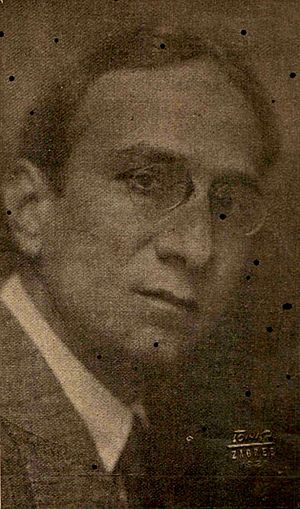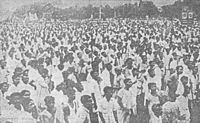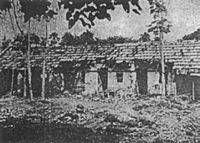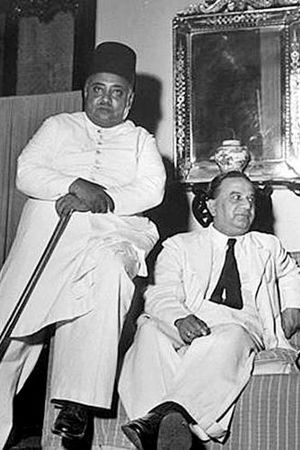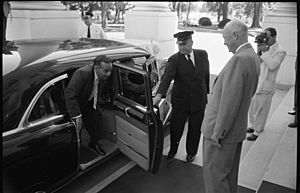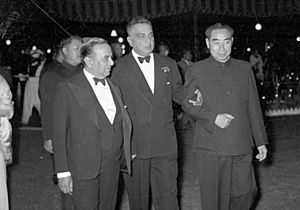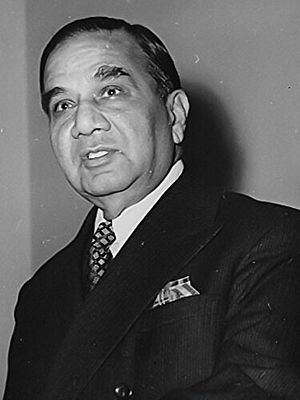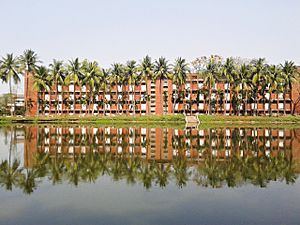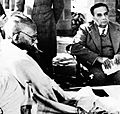Huseyn Shaheed Suhrawardy facts for kids
Quick facts for kids
Huseyn Shaheed Suhrawardy
হোসেন শহীদ সোহরাওয়ার্দী حسین شہید سہروردی |
|
|---|---|
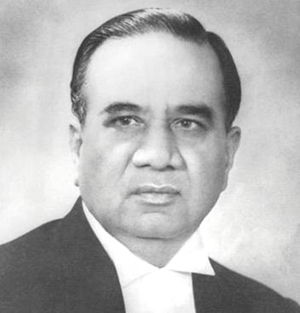 |
|
| 5th Prime Minister of Pakistan | |
| In office 12 September 1956 – 17 October 1957 |
|
| President | Iskandar Ali Mirza |
| Preceded by | Chaudhry Mohammad Ali |
| Succeeded by | I. I. Chundrigar |
| 3rd Prime Minister of Bengal | |
| In office 23 April 1946 – 14 August 1947 |
|
| Monarch | George VI |
| Governor General | Earl Wavell Earl Mountbatten |
| Preceded by | Sir Khawaja Nazimuddin |
| Succeeded by | Position abolished |
| Personal details | |
| Born | 8 September 1892 Midnapore, Bengal Presidency, British India (Now, West Bengal, India) |
| Died | 5 December 1963 (aged 71) Beirut, Lebanon |
| Cause of death | Cardiac arrest |
| Resting place | Three Leaders Mausoleum in Dhaka, Bangladesh |
| Citizenship | British India (1892–47) Indian (1947–49) Pakistani (1949–63) |
| Political party | All India Muslim League, Bengal Provincial Muslim League, Awami League |
| Other political affiliations |
Swaraj Party |
| Spouses | Begum Niaz Fatima (m. 1920; died. 1922) Vera Alexandrovna Tiscenko (m. 1940; div. 1951) |
| Children | Begum Akhtar Sulaiman (daughter), Rashid Suhrawardy (son) |
| Parents |
|
| Relatives | Suhrawardy family, Hasan Shaheed Suhrawardy (brother) Shaista Suhrawardy Ikramullah (cousin) Salma Sobhan (niece) Princess Sarvath al-Hassan (niece) Shahida Jamil (granddaughter) |
| Residences | Calcutta, Karachi and Dhaka |
| Alma mater | Calcutta University (BS in Maths, MA in Arabic lang.) St Catherine's College, Oxford (MA in Polysci and BCL) |
| Profession | Lawyer, politician |
Huseyn Shaheed Suhrawardy (born September 8, 1892 – died December 5, 1963) was a Bengali lawyer and politician. He served as the Prime Minister of Pakistan from 1956 to 1957. Before that, he was the Prime Minister of Bengal from 1946 to 1947, when it was part of British India.
In Pakistan, Suhrawardy is seen as one of the country's important founding leaders. In Bangladesh, he is remembered as a mentor to Sheikh Mujibur Rahman, who later became Bangladesh's founding leader. In India, some people remember him for his role during the 1946 Calcutta Killings and the Bengal famine of 1943.
Suhrawardy came from a well-known Muslim family in British Bengal. His father, Sir Zahid Suhrawardy, was a judge. Huseyn Suhrawardy studied law at Oxford University. When he returned to India, he joined the Indian independence movement in the 1920s. He became a leader for workers' rights in Calcutta.
He first joined the Swaraj Party. Later, he became a leader in the All-India Muslim League and its branch in Bengal, the Bengal Provincial Muslim League. In 1937, he was elected to the Bengal Legislative Assembly. In 1946, his party won the provincial election, and he became Bengal's last leader before the Partition of India. He suggested creating a Free State of Bengal, which would be an independent country. However, this idea was strongly opposed by the Congress Party. In 1947, Bengal was divided. Suhrawardy stayed in India for a short time before moving to Pakistan. He lived in both Karachi (Pakistan's capital) and Dhaka (capital of East Pakistan).
In Dhaka, Suhrawardy became the leader of the Awami League, a major opposition party. In 1956, the Awami League formed a coalition government with the Republican Party. Suhrawardy became Prime Minister. He made Pakistan's ties with the United States stronger by joining alliances like SEATO and CENTO. He was also the first Pakistani Prime Minister to visit Communist China. His pro-US foreign policy caused some disagreement within his party. His time as Prime Minister lasted about a year.
Suhrawardy was Prime Minister under Pakistan's first republican constitution, which ended the country's status as a dominion under the British Queen. After the military coup in 1958, Suhrawardy was arrested. He passed away in Beirut, Lebanon, in 1963 due to a heart attack. After his death, the Awami League focused more on Bengali nationalism and eventually led to Bangladesh's independence in 1971. He is buried in Dhaka alongside two other important Bengali leaders.
Contents
- Early Life and Family Background
- Political Journey
- Criticism and Legacy
- Images for kids
- See also
Early Life and Family Background
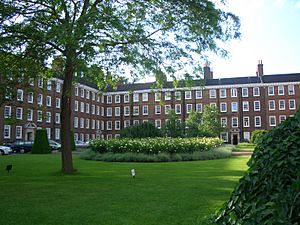
The Suhrawardy family is considered one of the most respected families in the Indian subcontinent. They trace their family history back to a Sufi leader named Shihab al-Din 'Umar al-Suhrawardi who lived in Baghdad in the 12th century.
Huseyn's grandfather, Ubaidullah Al Ubaidi Suhrawardy, was a Sufi leader in Dhaka. His father, Sir Zahid Suhrawardy, was a judge. His brother, Hasan Shaheed Suhrawardy, was a linguist and diplomat. His cousin, Shaista Suhrawardy Ikramullah, was one of the first women in South Asia to serve in public office.
Suhrawardy's first wife was Begum Niaz Fatima, who passed away in 1922. His second wife was Begum Veera Suhrawardy, a Russian actress.
A young Huseyn studied at Calcutta Madrasa and St. Xavier's College in Calcutta. He then went to St Catherine's College, Oxford in England, where he earned degrees in law and Arabic. He became a barrister, which is a type of lawyer, in 1922–23.
Suhrawardy had two sons. His first son, Shahab, passed away from pneumonia. His second son, Rashid Suhrawardy, became a British theatre actor. His granddaughter, Shahida Jamil, served as Pakistan's law minister.
Political Journey
Starting in Politics
Suhrawardy is known for being a key figure in modern political organizing in Bengal. He helped create 36 trade unions for workers like sailors, railway employees, and factory workers. These groups were mostly made up of Bengali Muslims.
Deputy Mayor of Calcutta
In 1923, Suhrawardy joined the Swaraj Party, led by C. R. Das. He became the Deputy Mayor of Calcutta in 1924. After Das passed away, Suhrawardy became more involved in Indian Muslim nationalism. He became a leader of the Bengal Provincial Muslim League (BPML), which was the local branch of the All-India Muslim League.
Forming Muslim Groups
Suhrawardy also formed several political groups for Bengali Muslims. These included the Calcutta Khilafat Committee in the 1920s, the Bengal Muslim Election Board, the United Muslim Party, and the Independent Muslim Party.
In the Bengal Assembly
In 1937, Suhrawardy was elected to the new Bengal Legislative Assembly. He was made Minister of Commerce and Labor. In 1940, the Lahore Resolution was passed, calling for independent states in Muslim-majority areas of India.
During World War II, Suhrawardy served as Minister of Civil Supplies. He was involved in efforts to help during the Bengal famine of 1943. Some people criticized his actions during this time, while others believed he worked hard to provide relief.
Prime Minister of Bengal (1946-1947)
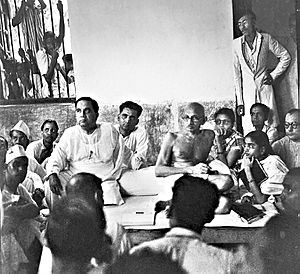
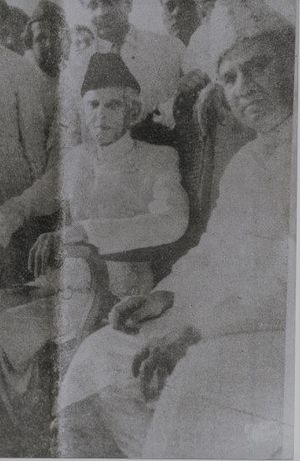
In the 1946 election, Suhrawardy led the Bengal Provincial Muslim League to a big win. His party won 113 out of 119 seats for Muslims in Bengal. Muhammad Ali Jinnah, the leader of the Muslim League, supported Suhrawardy becoming the Prime Minister of Bengal.
Calcutta Riots
Suhrawardy's time as Prime Minister saw the Great Calcutta Killings in 1946. The Muslim League called for a strike to push for the creation of Pakistan. This strike turned into violent riots between Hindus and Muslims, and many people were killed.
The riots started on August 16. Police reported excitement and violence across the city. A large Muslim League rally was held, and some reports suggest that speeches made there might have encouraged the violence. Suhrawardy later tried to control the situation by calling for peace and asking the army to step in.
Idea of United Bengal
In April 1946, Suhrawardy suggested that Bengal should remain undivided and become an independent country. He wanted to set aside religious differences to create a "Free State of Bengal." This idea was supported by some British officials and leaders from both Muslim and Hindu communities in Bengal.
The plan for a "Free State of Bengal" included sharing power equally between Hindus and Muslims. The British government even considered this idea seriously. The United States was also informed about the possibility of three countries emerging from the partition of India: Pakistan, India, and Bengal.
Partition of India
On June 20, 1947, the Bengal Legislative Assembly voted on the partition of Bengal. The assembly decided that Bengal should be divided. West Bengal would join India, and East Bengal would join Pakistan.
After the partition, Suhrawardy stayed in India for a few years to care for his family. He then moved to Pakistan and lived in both Karachi and Dhaka.
Awami League Leader
Suhrawardy joined the Awami League, a new political party formed in 1949 to challenge the ruling Muslim League. He became the central leader of the Awami League. His main political student in East Bengal was Sheikh Mujibur Rahman.
Law Minister of Pakistan
In 1953, Suhrawardy was appointed as the Law Minister in the cabinet of Prime Minister Mohammad Ali Bogra. He was responsible for helping to write Pakistan's new constitution.
Leader of the Opposition
In 1955, Suhrawardy became the Leader of the Opposition in Pakistan's parliament. His position became stronger after the Awami League's big victory in the 1954 East Bengali election.
Prime Minister of Pakistan (1956-1957)
In 1956, the Awami League formed a government with the Republican Party, and Suhrawardy became the fifth Prime Minister of Pakistan. He was known for being a politician who supported the United States. He also built good relations with China.
Suhrawardy supported American-led alliances like SEATO and CENTO. He was not in favor of being "non-aligned," which was a policy followed by neighboring India. He visited the United States, met with President Dwight D. Eisenhower, and even met movie stars in Hollywood.
In Pakistan, he focused on topics like nuclear energy, using foreign aid, and food policy. His strong pro-Western foreign policy led to a split in the Awami League, with some members forming a new party.
One Unit Policy
The "One Unit" policy in the 1956 constitution combined all the provinces of West Pakistan into a single unit. Prime Minister Suhrawardy initially promised to review this policy but later did not. Many people in West Pakistan wanted to bring back the old provinces.
Joint Electorate System
Suhrawardy tried to introduce a "joint electorate" system, where all citizens would vote together regardless of religion. Before this, elections used a "separate electorate" system, where seats were divided among religious groups. The Awami League wanted to abolish the separate system, but they faced opposition.
Nuclear Energy Development
Suhrawardy established the Pakistan Atomic Energy Commission (PAEC). He appointed Dr. Nazir Ahmad as its first chairman. Suhrawardy supported the "Atoms for Peace" program and provided money to import a nuclear reactor from America in 1956.
Economic Policies
In 1956, Prime Minister Suhrawardy stopped a program that aimed to share tax money equally between East and West Pakistan. He relied heavily on aid from the U.S. to deal with food shortages, especially in East Pakistan.
His economic policies led to some disagreements with the business community in West Pakistan. There were large worker strikes in major cities against his policies.
Foreign Relations
Suhrawardy is known for coining the phrase "friendship to all, malice to none," which later became a guiding principle for Bangladesh's foreign policy. He also helped shape Pakistan's foreign policy to strongly support the United States.
In 1957, Prime Minister Suhrawardy visited the United States and agreed to let the U.S. Air Force use an air base in Peshawar for intelligence gathering against the Soviet Union. This decision later caused problems for Pakistan.
Suhrawardy was invited to visit the Soviet Union but declined. In 1956, he became the first Pakistani Prime Minister to visit China. He also visited Afghanistan and Japan, seeing Japan as a model for development.
Resignation
Suhrawardy's time as Prime Minister ended when he resigned in 1957, under pressure from President Iskander Mirza.
Life After the Coup
After the military coup in Pakistan in 1958, Suhrawardy was arrested. While in jail, he wrote a letter to his niece, Salma Sobhan, for her wedding.
Criticism and Legacy
Suhrawardy is sometimes criticized in India for not being able to prevent the Direct Action Day riots. Some historians suggest that speeches by Muslim League leaders, including Suhrawardy, might have contributed to the tensions. However, there is also research that suggests Suhrawardy urged Muslims to return home during the riots and asked the British army to intervene.
Historians have different views on his role. Some believe he was partly responsible for the violence, while others point out that Hindu leaders were also involved. Some sources suggest he was seen as someone who could not control the situation, while his supporters believed the violence was aimed at weakening the Muslim League government.
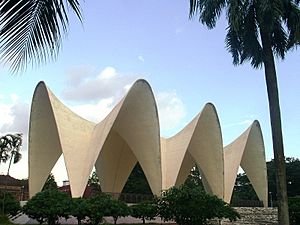
Suhrawardy passed away in Beirut, Lebanon, in 1963 from a heart attack. Many Bengalis believed he was killed because his popularity made him a strong rival to the then-military ruler, Ayub Khan. He was buried in Dhaka next to Sir Khawaja Nazimuddin and A. K. Fazlul Huq. This shows his important place in Bengali politics as one of the three leading statesmen of that time.
Many places in South Asia are named after him, including:
- Suhrawardy Udyan, a historic park in Dhaka.
- Shaheed Suhrawardy Medical College Hospital, a major hospital in Dhaka.
- Khayaban-e-Suhrawardy, a main road in Islamabad, Pakistan.
- Suhrawardy Hall at the University of Rajshahi.
In 2004, Suhrawardy was ranked number 19 in a BBC poll of the Greatest Bengali of all time.
Images for kids
See also
- Bengali nationalism in Pakistan
- Conservatism in Pakistan
- Pakistan–United States relations
 | Emma Amos |
 | Edward Mitchell Bannister |
 | Larry D. Alexander |
 | Ernie Barnes |


